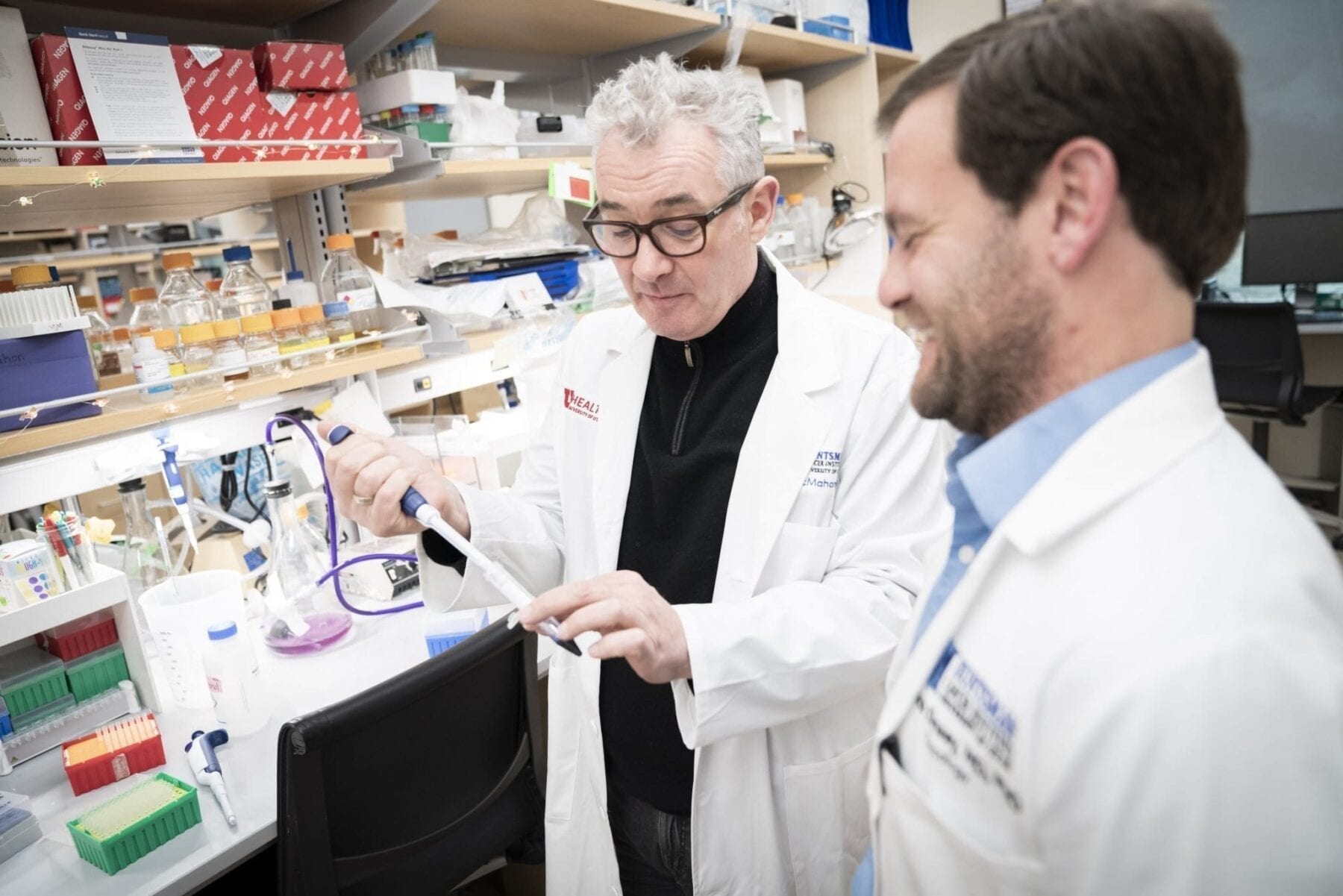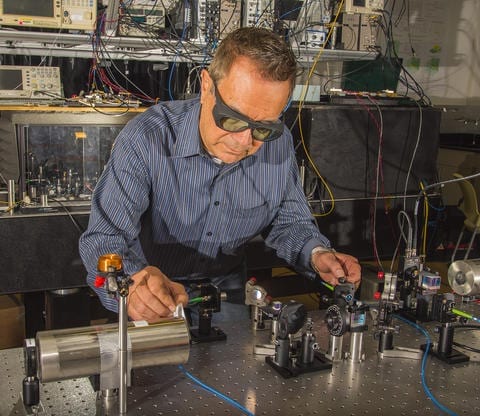
Survival rates in pancreatic cancer linked to inverse correlation between specific oncogene and tumor suppressant
A new Tel Aviv University study pinpoints the inverse correlation between a known oncogene — a gene that promotes the development of cancer — and the expression of an oncosuppressor microRNA as the reason for extended pancreatic cancer survival. The study may serve as a basis for the development of an effective cocktail of drugs for this deadly disease and other cancers.
The study, which was published in Nature Communications, was led by Prof. Ronit Satchi-Fainaro, Chair of the Department of Physiology and Pharmacology at TAU’s Sackler Faculty of Medicine, and conducted by Hadas Gibori and Dr. Shay Eliyahu, both of Prof. Satchi-Fainaro’s multidisciplinary laboratory, in collaboration with Prof. Eytan Ruppin of TAU’s Computer Science Department and the University of Maryland and Prof. Iris Barshack and Dr. Talia Golanof Chaim Sheba Medical Center, Tel Hashomer.
Pancreatic cancer is among the most aggressive cancers known today. The overwhelming majority of pancreatic cancer patients die within just a year of diagnosis. “Despite all the treatments afforded by modern medicine, some 75% of all pancreatic cancer patients die within 12 months of diagnosis, including many who die within just a few months,” Prof. Satchi-Fainaro says.
“But around seven percent of those diagnosed will survive more than five years. We sought to examine what distinguishes the survivors from the rest of the patients,” Prof. Satchi-Fainaro continues. “We thought that if we could understand how some people live several years with this most aggressive disease, we might be able to develop a new therapeutic strategy.”
Calling a nano-taxi
The research team examined pancreatic cancer cells and discovered an inverse correlation between the signatures of miR-34a, a tumor suppressant, and PLK1, a known oncogene. The levels of miR-34a were low in pancreatic cancer mouse models, while the levels of the oncogene were high. This correlation made sense for such an aggressive cancer. But the team needed to see if the same was true in humans.
The scientists performed RNA profiling and analysis of samples taken from pancreatic cancer patients. The molecular profiling revealed the same genomic pattern found earlier in mouse models of pancreatic cancer.
The scientists then devised a novel nanoparticle that selectively delivers genetic material to a tumor and prevents side effects in surrounding healthy tissues.
“We designed a nanocarrier to deliver two passengers: (1) miR-34a, which degrades hundreds of oncogenes; and (2) a PLK1 small interfering RNA (siRNA), that silences a single gene,” Prof. Satchi-Fainaro says. “These were delivered directly to the tumor site to change the molecular signature of the cancer cells, rendering the tumor dormant or eradicating it altogether.
“The nanoparticle is like a taxi carrying two important passengers,” Prof. Satchi-Fainaro continues. “Many oncology protocols are cocktails, but the drugs usually do not reach the tumor at the same time. But our ‘taxi’ kept the ‘passengers’ — and the rest of the body — safe the whole way, targeting only the tumor tissue. Once it ‘parked,’ an enzyme present in pancreatic cancer caused the carrier to biodegrade, allowing the therapeutic cargo to be released at the correct address — the tumor cells.”
Improving the odds
To validate their findings, the scientists injected the novel nanoparticles into pancreatic tumor-bearing mice and observed that by balancing these two targets — bringing them to a normal level by increasing their expression or blocking the gene responsible for their expression — they significantly prolonged the survival of the mice.
“This treatment takes into account the entire genomic pattern, and shows that affecting a single gene is not enough for the treatment of pancreatic cancer or any cancer type in general,” according to Prof. Satchi-Fainaro.
Learn more: Novel Nanomedicine Inhibits the Progression of Pancreatic Cancer in Mouse Models, TAU Researchers Say
The Latest on: Pancreatic cancer
[google_news title=”” keyword=”pancreatic cancer” num_posts=”10″ blurb_length=”0″ show_thumb=”left”]- Cold Spring Harbor Lab scores $15M from NYS for new pancreatic research centeron May 6, 2024 at 8:08 am
The new center will aim to advance research to diagnose and treat pancreatic cancer, and bring high-paying jobs to the region ...
- Alpha Tau Presents Preclinical Data Demonstrating Abscopal Immune Effect in Pancreatic Murine Tumor Models at ESTRO 2024 Congress in Glasgowon May 6, 2024 at 6:03 am
Initial data demonstrates significant reduction in distant pancreatic cancer tumor growth rate starting from three weeks after first tumor is ...
- Unite in the Fight: celebrating those who've conquered and are still fighting canceron May 4, 2024 at 8:16 pm
On Saturday, the Georgia Cancer Center hosted its annual Unite in the Fight Against Cancer. Survivors, friends and family joined in one mile walk celebrating and honoring those who have been impacted ...
- Cold Spring Harbor Lab wins $15 million from NYS for pancreatic cancer researchon May 4, 2024 at 4:08 am
The state will put $15 million toward a $30 million research center at Cold Spring Harbor Laboratory for pancreatic cancer, a disease that is fatal for most people, Gov. Kathy Hochul told Newsday on ...
- MicroRNAs May Predict Pancreatic Cancer Risk Years Before Diagnosison May 3, 2024 at 7:15 am
Expression levels of several microRNAs in plasma samples can help predict the onset of pancreatic cancer up to 5 years prior to clinical diagnosis.
- Pancreatic Cancer Cells Differ by Location and May Inform Targeted Treatmentson May 1, 2024 at 5:00 pm
A new study has found that pancreatic cancer cells are different based on their location in the pancreas, providing new information about tumors that could lead to better targeted treatments.
- Researchers find difference in pancreatic cancer cells, offering new hope for immunotherapy effectivenesson May 1, 2024 at 6:42 am
A new study has found that pancreatic cancer cells are different based on their location in the pancreas, providing new information about tumors that could lead to better targeted treatments.
- Pancreatic Cancer: Successful Trial Against Pancreatic Cancer with Defence Therapeutics' ARM-002 Anti-Cancer Vaccineon May 1, 2024 at 12:15 am
Defence Therapeutics Inc. (CSE: DTC) (OTCQB: DTCFF) (FSE: DTC), ("Defence" or the "Company"), a Canadian biopharmaceutical company developing novel immune-oncology therapeutics and drug delivery ...
- Study highlights differences in pancreatic cancer cells based on locationon April 30, 2024 at 9:47 pm
A new study has found that pancreatic cancer cells are different based on their location in the pancreas, providing new information about tumors that could lead to better targeted treatments.
- PurpleStride Pittsburgh charity walk raises money for pancreatic cancer researchon April 29, 2024 at 7:17 am
The Pancreatic Cancer Action Network held Purple Stride Pittsburgh, where survivors, families, caregivers, researchers and supporters raise money through the walk. KDKA-TV's Kristine Sorensen served ...
via Google News and Bing News










